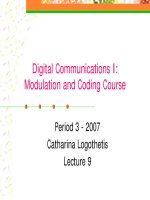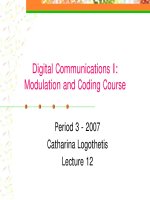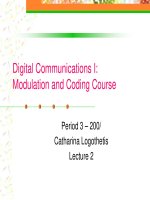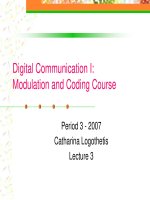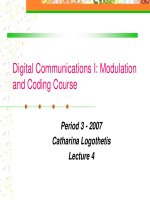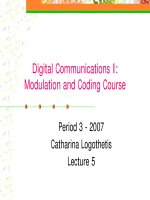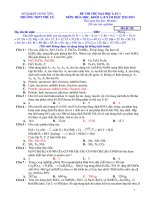NURSING AND MIDWIFERY COURSE GUIDE 2013 potx
Bạn đang xem bản rút gọn của tài liệu. Xem và tải ngay bản đầy đủ của tài liệu tại đây (1.59 MB, 12 trang )
latrobe.edu.au
Postgraduate
NURSING
AND MIDWIFERY
COURSE GUIDE 2013
CONTENTS
Why study nursing and midwifery at LaTrobe? 1
Fees, support and scholarships 2
Courses at a glance 3
Master of Mental Health 4
Postgraduate Diploma in Midwifery Science 4
Master of Midwifery 5
Master of Nursing 6
Master of Nursing (Nurse Practitioner) 8
Research programs 9
Apply now 9
The percentage of Australians
with Bachelor’s degrees increased
from 15 per cent in the mid-1990s
to 23 per cent in 2005
*
– and it’s
still growing. A postgraduate
degree can help you stand out
in an increasingly competitive
job market.
* Australian Social Trends 2007
Article: Qualification profile of Australians,
Australian Bureau of Statistics, August 2007.
1Nursing and Midwifery Postgraduate Course Guide 2013
WHY STUDY NURSING AND
MIDWIFERY AT LA TROBE?
La Trobe University has consistently ranked among the
top 500 Universities in the world since 2003
*
. The QS World
University Rankings 2011–2012 placed us at 317 globally.
*Academic Ranking of World Universities
We’re an Australian pioneer in nursing and
midwifery education. In 1974, LaTrobe
became the first provider of tertiary-based
education for nurses. Our experience has
helped us build an innovative curriculum that
produces highly respected graduates.
A WIDE RANGE OF SpECIALISATIONS
We oer a wide range of specialisations
for you to choose from. These include:
§ Acute Care
§ Breast Care
§ Cancer and Palliative Care
§ Cardiac Care
§ Child, Family and Community
§ Critical Care
§ Emergency Care
§ Intensive Care
§ Mental Health
§ Midwifery
§ Nurse Practitioner
§ Neonatal Care
§ Perianaesthetic Care
§ Perioperative Care
§ Renal Care
§ Urology and Continence.
ENvIABLE pRACTICAL LEARNING
AND INDUSTRY pARTNERSHIpS
We have partnerships with leading
Victorian hospitals and healthcare
organisations, as well as clinical schools
at The Alfred, Austin Health, Northern
Health, Royal Melbourne, Mercy Health,
and The Royal Women’s hospitals.
For many of our courses, you’ll study
theoretical course components through
LaTrobe and complete practical clinical
requirements at Austin Health, The Alfred
Health or other healthcare providers.
WE ARE A LEADER IN NURSING
AND MIDWIFERY RESEARCH
Our research focuses on elderly care issues,
cancer and palliative care, community
nursing, mental health nursing, mother
and child health, and midwifery.
We have aligned research centres including
Mother and Child Health Research Centre,
and the Australian Institute for Primary Care
and Ageing Research Centre.
Our research strengths are:
§ Pregnancy and Childbirth
§ Women’s Health
§ Cancer and Palliative Care
§ Community Nursing
§ Consumer Participation
§ Wound Management
§ Indigenous Health
§ Mental Health Nursing
§ Ageing and End of Life Care
§ Perinatal and Child Health
§ Nursing Education
§ Personal Experiences of Health and Illness.
To learn more about applying for our
nursing research degrees please see inside
back cover.
FLExIBLE LEARNING TO SUIT YOU
Our programs are taught using a variety
of on-site, distance education, and online
approaches to help you fit your studies
in with life’s other commitments. We also
oer our programs in part-time, full-time
and flexi-modes so you decide how much
you take on.
SHORT COURSES AND SINGLE
SUBjECTS
We oer a variety of single subjects
and short courses for those who’d like
a taste of postgraduate study at LaTrobe.
These include:
§ Nurse Immuniser Program
§ Wound Management Training
§ Special Care of the Neonate
§ Breast Care Nursing
§ Clinical Audit
§ Nursing People with Lung Cancer
§ Prostate Nursing Care
§ Management of Skin Ulcers and Lesions
§ Clinical Practice Development
§ Initial Registration for Overseas Nurses
(IRON Program)
§ Return to Practice Course for Australian
Educated Nurses
§ Medication Management for Nurses.
Learn more about our short courses at:
latrobe.edu.au/courses/nursing/short-courses
DID YOU kNOW?
The average salary for a
postgraduate qualified worker is
nearly $20,000 more per year than
for those with a Bachelor’s degree.
Australian Social Trends 2007
Article: Qualification profile of Australians,
Australian Bureau of Statistics, August 2007.
2 Nursing and Midwifery Postgraduate Course Guide 2013
FEES, SUppORT
AND SCHOLARSHIpS
This information is only relevant to Australian
and New Zealand citizens and permanent
residents of Australia. If you’re an
international applicant, see LaTrobe’s
International Postgraduate Course Guide
2013, or visit:
latrobe.edu.au/international
COMMONWEALTH
SUppORTED pLACES
There may be a limited number
of Commonwealth Supported Places
(CSP) available for certain courses and
clinical specialisations. Please check
with the University about the availability
of CSP places.
With a CSP, you only pay a contribution
toward the cost of the course and the
Australian Government pays the rest.
In 2012, the basic annual student
contribution rates for CSPs in Nursing
was up to A$5,648 per year.*
* Information is for 2012 only.
Rates may change in 2013.
FULL-FEE pLACES
Alternatively, for full-fee paying places, you
pay the full cost of the course. You’ll find
indicative 2012 full fees for your course
on page 3.
MORE INFORMATION ABOUT FEES
Student contributions for CSPs and costs for
full-fee places at university vary by course.
Both fees and student contribution rates
usually rise by about seven per cent annually.
For general CSP and fee details, see:
latrobe.edu.au/postgrad/fees-scholarships
FEE-HELp AND HECS-HELp
You could be eligible for government
loans to pay full fees (through FEE-HELP)
or your CSP student contribution (through
HECS-HELP). For detailed information
on FEE-HELP and HECS-HELP, call
1800020108 or visit:
studyassist.gov.au
INCOME SUppORT FOR
SELECTED COURSES
If you enrol in either a Master of Nursing
(Child, Family and Community) or a Master
of Nursing (Nurse Practitioner), you could
be eligible for government-provided income
support. To find out more, call Centrelink
on 132 490 or visit the Commonwealth
Department of Education, Employment
and Workplace Relations (DEEWR):
deewr.gov.au
SCHOLARSHIpS
As a postgraduate student, you could
be eligible for scholarships, awards and
prizes. To see if you’re eligible for any
scholarships, visit:
Coursework
latrobe.edu.au/scholarships/postgraduates
Research
latrobe.edu.au/research/future/scholarships
You may be eligible for a loan, income support or scholarships
to help you manage the costs of postgraduate study.
3Nursing and Midwifery Postgraduate Course Guide 2013
COURSES AT A GLANCE
Course Page Campus Duration
Semester
starts
Early exit option
(Certificate/
Diploma)
Indicative
(2012)
fees (A$) Prerequisites
NURSING COURSEWORk pROGRAMS
Masterof
MentalHealth
BEN
Full-time
years
Part-time
equivalent
-years
YesGraduate
Certificateor
Postgraduate
Diploma
TBA** § Bachelor’s degree in nursing, social work, occupational
therapy or psychology.
§ Registration with relevant board.
§ Employed by a service approved by the Course Coordinator.
DE
Postgraduate
DiplomainMidwifery
Science
MEL
Full-time
year
Noearlyexit
option
per
credit
points
§ Must be a current Registered Nurse with the Australian
Health Practitioner Regulation Agency (AHPRA) or
equivalent.
§ Hold a degree or a diploma in Nursing.
§ A minimum of one year’s recent acute nursing experience.
§ Have a clinical place at an approved clinical midwifery
agency in either the metropolitan or regional area before
the start of the course.
BEN
MasterofMidwifery
MEL
Full-time
year
Part-time
equivalent
years
Yes
Postgraduate
Diplomaonly
per
credit
points
§ Must be a current Registered Nurse with endorsement to
practice as a Midwife with the Australian Health Practitioner
Regulation Agency (AHPRA) or equivalent.
§ Postgraduate Diploma in Midwifery Science or
its equivalent.
§ At least one year’s recent clinical practice in midwifery and
be employed in an approved area of midwifery practice.
DE
MasterofNursing*
MEL
Full-time
years
Part-time
equivalent
–years
YesGraduate
Certificateor
Postgraduate
Diploma
TBA** § Must be a current Registered Nurse with the Australian
Health Practitioner Regulation Agency (AHPRA) or
equivalent.
§ At least one year of recent relevant nursing experience.
§ Degree or diploma from a college or university or
a nursing certificate from a hospital-based program.
§ Employed in the relevant clinical area by an agency
approved by the Course Coordinator.
Studentsmustapplytothehospitalfortheirclinical
placementatthesametimeastheyapplyforthecourse
StudentsapplyingtoundertaketheMasterofNursing
(ChildFamilyCommunity)mustalsoholdcurrent
registrationwithAHPRAtopracticeasaMidwife
DE
MasterofNursing
(NursePractitioner)
MEL
Full-time
year
Part-time
equivalent
–years
Noearlyexit
option
(per
credit
points)
§ Must be a current Registered Nurse with the Australian
Health Practitioner Regulation Agency (AHPRA) or
equivalent.
§ At least three years of recent relevant nursing experience.
§ Postgraduate Diploma in a specialty.
§ Employed by an agency approved by the Course
Coordinator.
§ Employer/organisational support for a period of candidacy.
DE
kEY TO COURSES
Campuses
MEL
Melbourne
BEN
Bendigo
DE
DistanceEducation
HOW TO GET MORE INFORMATION
Visit Find a Course for more course
information:
latrobe.edu.au/courses
Browse discipline areas at the faculty
website:
latrobe.edu.au/courses/nursing/
postgraduate
* Please note that this course is under review and may change in 2013. **Fees are yet to be finalised. For up-to-date fee information, please visit:
latrobe.edu.au/courses/nursing/postgraduate
NEW IN 2013
LaTrobe’s School of Nursing and Midwifery
is introducing a new course structure aimed
at providing you with innovative learning
methods and flexible study options.
This includes a flexible Master’s degree with
a choice of clinical specialisations. You also
have the option to exit early and receive
either a Graduate Certificate or a
Postgraduate Diploma.
4 Nursing and Midwifery Postgraduate Course Guide 2013
nursing and midwifery
This course aims to provide you with
a deeper understanding of mental health,
through systematic analysis and reflection
on the relationships between theory and
clinical practice. It oers you a strong
evidence base, supported by clinical skill
development and life-long learning skills.
Industry credit
You may be eligible for institutional
credit – please contact the Faculty for
more information.
Delivery mode
This course is oered via a flexible online
delivery mode. This caters to students who
work, live in rural or remote areas, live
interstate or may otherwise not be in a
position to attend face to face lectures or
tutorials. Access to the internet is required
for this course.
MASTER OF MENTAL HEALTH
Course structure
The course has three exit points: Graduate
Certificate, Postgraduate Diploma and
Master’s level (see the table below).
Clinical placement
This course requires a minimum of 140 hours
of supervised clinical placement which will
be linked to your employer or other service.
pOSTGRADUATE DIpLOMA
IN MIDWIFERY SCIENCE
This course prepares appropriately qualified
nurses for registration as a midwife with the
Australian Health Practitioner Regulation
Agency. You’ll develop the skills necessary
to practice midwifery within a framework of
wellness. This includes the ability to assess,
plan, implement and evaluate midwifery
care. You’ll also develop the knowledge
necessary to recognise abnormalities during
pregnancy, labour and the post birth period,
and to initiate the appropriate action.
pOSTGRADUATE DIpLOMA IN MIDWIFERY SCIENCE
SAMpLE COURSE STRUCTURE
MASTER OF MENTAL HEALTH SAMpLE COURSE STRUCTURE
Delivery mode
This course is oered on campus. You’ll be
required to attend lectures and tutorials
conducted in block mode. Theoretical
content is introduced in lecture blocks at
the start of each semester and continued
through e-learning and flexible learning
modules throughout the semester. The
structure of this course allows a clinical
component to be undertaken three days
per week for the majority of the semester.
Please note that dates for lecture blocks vary
for students enrolled at dierent campuses,
and subjects delivered online may require
Internet access with broadband speed.
Clinical placement
You’ll be required to participate in a
minimum of 704 hours or 88 days (eight
hours/day), of clinical placements over
two semesters or until LaTrobe University
School of Nursing and Midwifery and
Australian Health Practitioner Regulation
Agency requirements are achieved.
MID4PMB
Postnatal Care of Mother & Baby
MIDNOB
Normal Birth in Midwifery Practice
MID4PES
Perspectives in Midwifery Practice
NSG4CAU
Clinical Audit
MID4CTB
Challenges to Birth in Midwifery Practice
MID4TCN
The Complex Neonate
Semester 1
Semester 2
YEAR 1
Clinical Practice in Mental Health 1
Clinical Practice in Mental Health 2
Semester 1
Semester 2
YEAR 1
Advanced Mental Health Practice 1
Clinical Project
Advanced Mental Health Practice 2
Minor Thesis B
Research Foundations
Independent Study Subject
Clinical Practice Development
Minor Thesis A
Semester 1
Option 1
Semester 2
Option 2
YEAR 2
YEAR 3
5Nursing and Midwifery Postgraduate Course Guide 2013
nursing and midwifery
MASTER OF MIDWIFERY
If you’re a qualified and experienced
midwife, our Master of Midwifery program
is a way for you to undertake advanced
studies in midwifery, consistent with the
increasing professionalism expected of
practising midwives.
This course includes study areas such as
management, education, research training
and practice enhancement.
MID5CBW
Childbirth and Wellbeing
NSG5REF
Research Foundations
MID5AMD
Advanced Midwifery Studies
Semester
1 or 2
YEAR 1
MASTER OF MIDWIFERY
SAMpLE COURSE STRUCTURE
Please note that this course is under review and may change in 2013. For detailed course information, select the ‘Full Course Details’ link for your campus in the
Master of Midwifery entry at: latrobe.edu.au/courses. For detailed subject information, enter subject codes (from the table above) into our subject database
at: latrobe.edu.au/udb_public
Upon successful completion of the course,
graduates may be eligible for entry to
doctoral candidature.
Course structure
The Master of Midwifery is a 120-credit point
award comprising of two study options:
Option 1–three core subjects, and a
research project culminating in a thesis
of approximately 15,000-words.
Option 2–three core subjects plus a clinical
project, and one elective subject chosen
from a range of Master’s subjects oered
by the School of Nursing and Midwifery.
Study options
You can complete this course in a variety
of flexible learning modes.
MID5MTB
Midwifery Thesis B
Elective
MID5MTA
Midwifery Thesis A
NSG5CLP
Clinical Project
Option 1
Option 2
YEAR 2
6 Nursing and Midwifery Postgraduate Course Guide 2013
nursing and midwifery
MASTER OF NURSING
Our flexible Master of Nursing allows you to choose a
specialisation, and gives you the option of exiting early
from the degree with either a Graduate Certificate or a
Postgraduate Diploma.
This course is ideal for suitably qualified
nurses who want to pursue a career in
one of the specialisations oered, while
undertaking advanced clinical training.
COURSE STRUCTURE*
All students must enrol in the Master’s
program, but you can choose to exit early
and receive either a Graduate Certificate
or a Postgraduate Diploma.
Graduate Certificate (60 credit points)
Requirements: Completion of two
Foundations for Specialty Practice subjects.
Please note that if you enrol in the Child,
Family and Community major you can only
finish at either Postgraduate Diploma or
Master’s level.
Postgraduate Diploma
(120 credit points)
The Diploma requires the completion
of Certificate subjects plus an additional
60 credit points, which include:
§ two core subjects (Clinical Practice
Development and Research Foundations);
and
§ two Advanced Practice subjects with
elective modules that focus on your
chosen career pathway.
Master (180 credit points)
Having completed Postgraduate Diploma
requirements, you can choose to complete
the final 60 credit points as either:
§ a Clinical Project and an Independent
Study Unit; or
§ a Minor Thesis.
For more information, see:
latrobe.edu.au/courses/nursing/
postgraduate
Cancer / Palliative Care
Prepares qualified nurses to extend and
deepen their knowledge of cancer/palliative
care nursing as it occurs in a variety of
settings and as it relates to advanced nursing
knowledge. It aims to provide Registered
Nurses with the theoretical preparation
that meets the national professional level
for specialist cancer nurses in Australia.
Cardiac Care
Develops your theoretical knowledge
and practical skills in caring for medical,
interventional, and cardiac surgical patients.
You’ll examine the pathophysiology,
assessment and management of patients
with cardiac disease and explore the
psychosocial, ethical, and rehabilitation
aspects of their nursing care. You’ll also
gain experience in technological aspects
of cardiac nursing during practical skills
workshops. There is a minimum clinical
requirement, with study days held at the
LaTrobe/Alfred Clinical School.
Child, Family and Community
Prepares you for a broad community
approach to nursing children and families,
particularly those who are prenatal to
school-entry age.
Critical Care
Provides you with the in-depth knowledge
and skills required to practise in
contemporary critical care nursing. It oers
you a strong evidence base, supported by
appropriate clinical skill development, along
with the necessary life-long learning skills.
Specialty units enable you to undertake
focused and advanced clinical studies, and
you’ll also complete supervised and assessed
clinical practice.
STUDY OpTIONS
Depending on your choice of specialisation,
you’ll study via our flexible online delivery
mode and/or in-person at one of our
aliated hospitals. For most subjects,
the online learning modules are supported
by a limited number of on-campus
workshop days (or equivalent online virtual
classrooms) with location dependent on
specialisation. All online subjects require
broadband Internet access.
INDUSTRY CREDIT
You may be eligible for institutional
credit–please contact the Faculty for
more information.
AvAILABLE SpECIALISATIONS
Applicants for the Master of Nursing can
choose one of the specialisations listed below.
Acute Care
Get the in-depth knowledge and skills
required to practise in contemporary acute
care nursing. This specialisation features a
strong evidence base supported by clinical
skill development and life-long learning
skills. Specialty subjects allow you to
undertake focused and advanced clinical
studies. You’ll also need to undertake
supervised and assessed clinical practice.
Breast Care
The Breast Care program is designed to
prepare qualified nurses to care for people
with breast cancer from the time of
screening to diagnosis, and throughout the
disease trajectory. This program features the
latest developments in research, treatments
and psychosocial support.
* This course is currently undergoing approval and is subject to change.
7Nursing and Midwifery Postgraduate Course Guide 2013
nursing and midwifery
Emergency Care
Aims to help you develop a deeper
understanding of emergency nursing,
through systematic analysis and reflection on
the relationships between theory and clinical
practice. It also aims to give you in-depth
knowledge and life-long learning skills
required in contemporary emergency
nursing. Specialty units enable you to
undertake focused and advanced clinical
studies, and you’ll also complete supervised
and assessed clinical practice.
Intensive Care
Provides a range of opportunities for you to
develop a deeper understanding of intensive
care nursing through systematic analysis
and reflection on the relationships between
theory and practice.
Neonatal Care
With optional pathways of either neonatal
intensive care or neonatal special care, the
course provides you with the knowledge
and skills needed to care for premature,
low birth weight and sick infants and
their families, in these two specialist areas
of neonatal nursing. The course oers a
range of opportunities to develop a deeper
understanding of relationships between
theory and evidence based practice through
critical thinking, systematic analysis and
reflection. The pathways are determined
by clinical placement and subject selection.
Perianaesthetic Care
This dynamic field involves nurses providing
preoperative and intraoperative care to
patients undergoing anaesthesia during
surgery, as well as being involved in the care
of the patient in post-surgery recovery.
This program oers qualified nurses the
opportunity to gain experience in areas
such as anaesthesia, postanaesthesia care,
surgical specialities and supplies, day
procedures and perioperative nursing.
Perioperative Care
Focusing on the psychosocial and
physiological needs of each patient, the
perioperative nurse functions as a key
member of the multidisciplinary team
to plan, implement and evaluate patient
interventions through the preoperative,
intraoperative and post-operative phases
of care. This course is a pathway to
advanced professional practice. You’ll
expand your knowledge with in-depth and
systematic analysis of theory and practice,
and enhance your career potential and
patient care outcomes.
Renal Care
Prepares Registered Nurses for advanced
practice as specialist renal nurses. As a
graduate, you’ll have the knowledge, skill
and confidence to provide quality nursing
care for in-patient and community-based
clients from diverse backgrounds who
require dialysis, transplantation and other
interventions for acute and chronic renal
failure and associated conditions.
Urology and Continence
Provides you with the opportunity to
examine contemporary urological and
continence nursing and to advance
knowledge and skills in this specialist
area of practice. You’ll focus on advanced
assessment related to bowel and bladder
health; pathological mechanisms and
therapeutic approaches to bowel and
bladder problems; the psychosocial impact
of urological and continence problems;
and the specialist role in urological and
continence nursing practice.
Advanced Practice B
Foundations for Specialty Practice B
Minor Thesis B
Independent Study Unit
Advanced Practice A
Foundations for Speciality Practice A
Minor Thesis A
Clinical Project
Research FoundationsClinical Practice Development
Semester
1 or 2
Semester
1 or 2
Option 1
Option 2
YEAR 1
YEAR 2
YEAR 3
MASTER OF NURSING
SAMpLE COURSE STRUCTURE
This course is currently undergoing approval and is subject to change – for further information, please visit: latrobe.edu.au/courses/nursing/postgraduate
“La Trobe is the
only university in
Victoria who oer
neonatal nursing as a
postgraduate speciality.
My supervisor for my
Master’s was an expert
in neonatal nursing
which provided me
with the confidence
and support I needed.”
Chelsea Webster
Master of Nursing
(Neonatal Care)
8 Nursing and Midwifery Postgraduate Course Guide 2013
nursing and midwifery
MASTER OF NURSING
(NURSE pRACTITIONER)
This program is designed for nurses who wish to gain
endorsement from the Australian Health Practitioner
Regulation Agency to work in their specialty as a
Nurse Practitioner.
This course provides you with the skills and
knowledge you need to provide detailed,
holistic care to your patients. All applications
are considered on an individual basis, but
most of our Nurse Practitioner students
usually hold a Postgraduate Diploma in their
chosen specialty and are currently working
in that specialty.
Course structure
This program is a 120 credit point program
which consists of three core subjects
and a 60 credit point clinical internship.
The internship provides you with extended,
supervised and supported clinical practice
to consolidate and apply your coursework
learning in preparation for a Nurse
Practitioner endorsement.
Generally, students complete the core
subjects Advanced Clinical Practice,
Therapeutic Medication Management
and Clinical Practice Development in the
first year and the clinical internship in
the second year.
If LaTrobe receives insucient enrolments
for Therapeutic Medication Management,
you may need to enrol in a cross-institutional
therapeutic education subject.
NSG5TMN
Therapeutic Medication Management
NSG5ACP
Advanced Clinical Practice
NSG5PCA
Nurse Practitioner Clinical Internship A
NSG5CPD
Clinical Practice Development
NSG5PCB
Nurse Practitioner Clinical Internship B
Semester 1
Semester 1
Semester 2
Semester 2
YEAR 1
YEAR 2
MASTER OF NURSING (NURSE pRACTITIONER)
SAMpLE COURSE STRUCTURE
Please note that this course is under review and may change in 2013. For detailed course information, select the ‘Full Course Details’ link for your campus in the
Master of Nursing (Nurse Practitioner) entry at: latrobe.edu.au/courses For detailed subject information, enter subject codes (from the table above) into our
subject database at: latrobe.edu.au/udb_public
Study options
You can complete this course in a variety
of flexible learning modes, including
face-to-face teaching, clinical practice
and online learning. Some online subjects
require broadband Internet access.
Clinical placement
All potential Nurse Practitioner candidates
must be working clinically in their specialty.
AppLY NOW
Applying for postgraduate courses at
LaTrobe is straightforward–just make sure
you supply all requested information so your
application isn’t delayed.
Please note: This information is only relevant
to Australian and New Zealand citizens and
permanent residents of Australia.
If you’re an international applicant, see
LaTrobe’s International Postgraduate
Course Guide 2013, or visit:
latrobe.edu.au/international
Coursework programs
Applying for a coursework program at LaTrobe
mostly involves supplying information to prove
you meet the minimum course requirements.
To apply for a coursework program, visit:
latrobe.edu.au/postgrad/apply/
coursework-programs
Important dates
Applications for most coursework programs
close between late October and late January
for Semester 1, and in July for mid-year
entry (if it’s available for that course). If you
miss the closing date, talk to the Future
Students Centre on 1300 135 045 about late
applications for your course.
Research programs
The content of your research program will
depend on the topic and supervisor you
choose, so it’s important to do plenty of
thinking and investigation before you decide.
To apply for a research program, visit:
latrobe.edu.au/postgrad/apply/
research-programs
Important dates
You can apply for research candidature at
any time. However, if you’re a local applicant,
applications for research scholarships close
on 31 October.
See our available research scholarships at:
latrobe.edu.au/research/future/scholarships
The School of Nursing and Midwifery oers
an exceptional postgraduate sta to student
ratio and can therefore ensure that research
students receive high-quality supervision.
Our academic sta supervise at all levels
and are dedicated to assisting each student
to begin and successfully complete their
research program.
RESEARCH pROGRAMS
There are many entry points depending
on your training needs. An Honours or a
Master’s degree will provide you with basic
research skills and allow you to undertake
a small research project.
From here you could go on to gain a PhD
or a Professional Doctorate and investigate
a single topic in depth to become an expert
in your chosen subject.
For more information on our
research programs please visit:
latrobe.edu.au/courses/nursing/research
NURSING AND MIDWIFERY
5330
Disclaimer: The information contained in this brochure is indicative only. The University does not give any warranties in relation to the currency, accuracy or completeness of the contents.
The University reserves the right to make changes without notice at any time in its absolute discretion, including but not limited to varying admission and assessment requirements, and
discontinuing or varying courses. Users of this publication are advised to check with the relevant faculty or department before acting on the information published in this brochure. To the
extent permitted by law, the University does not accept responsibility or liability for any injury, loss, claim or damage arising out of or in any way connected with the use of the information
contained in this brochure or any error, omission or defect in the information contained in this brochure.
Published by LaTrobe University, July 2012. LaTrobe University is a registered provider under the Commonwealth Register of Institutions and Courses for
Overseas Students (CRICOS). CRICOS Provider 00115M
latrobe.edu.au CRICOS Provider 00115M
Open Days 2012
Melbourne Sunday 26 August
Bendigo Sunday 19 August
Albury-Wodonga Sunday 5 August
Mildura (evening) Friday 17 August
Shepparton (evening) Friday 10 August
Want to know more? Get in touch!
Future Students Centre
T 1300 135 045
latrobe.edu.au/study
Ask us a question
latrobe.edu.au/ask
Read more about LaTrobe courses
latrobe.edu.au/courses
Register for updates
latrobe.edu.au/keepintouch
Connect
facebook.com/latrobe
twitter.com/latrobe
iTunes
Search La Trobe University on iTunes U
LaTrobe on YouTube
youtube.com/latrobeuniaustralia

